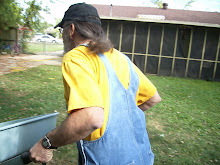Behold, I will cause breath to enter into you and ye shall live.-Ezekiel 37:5b.
Being a film buff, there are iconic scenes burned into my memory. In Casablanca, for example, when Victor Laszlo launches the nightclub patrons into a stirring rendition of "La Marsellaise," drowning out the Nazi soldiers' singing of "Die Wacht Am Rhein."
These memories occur sometimes at odd moments. Whenever I begin to read Ezekiel 37, for example, I cannot help but recall the graveyard scene at the end of The Good, The Bad and The Ugly.
And I picture Ezekiel, who has perhaps been in prayer, transported in the Spirit and set in the middle of a valley. As he slowly raises his head, the camera of my mind pulls back gradually to reveal bones, everywhere bones, dry bones in a vast amphitheater of the dead.
"Can these bones live?"
In the film scene, the character Tuco crosses himself, obviously convinced of the finality represented by the sheer countlessness of the graves all around him.
Ezekiel, being a man of God, has an answer more fitting to the person of faith:
"O Sovereign LORD, you know."
How perfectly in tune this is with Jonah's declaration that "Salvation is of the LORD."
The question is one of regeneration, restoring and renewing of life. A resurrection of the dead, actually. This is accepted throughout Christianity.
At the heart of the dispute between the doctrines of grace and any other view of Christian salvation is the question, "When does this rebirth occur?"
Many would say that faith must come before the heart can be renewed from a heart of stone to one of flesh, one able to love and desire God and seek after Him.
We have but to remain in Ezekiel (11:19; 36:26) to see that this new heart of faith is nothing other than a gift from God. Even the Arminian slanted notes and references of the NIV translation I possess refer the reader to 2 Corinthians 3:3, where Paul speaks of the heart as written upon by God the Holy Spirit.
The question is not whether we are dead in trespasses and sins (Ephesians 2:1). But, rather:
"Can these bones live?"
Not just dead bones. Dry bones. Bleached in the sun, scorched by the scirrocco wind blowing in off the desert. Is there anything as devoid of life as a dead, dried-out bone?
Certainly we find no record of the bones crying out, "Give us life."
No account of Lazarus pleading to Jesus for life.
Jairus' daughter did not send to Jesus to come and raise her dead body.
The two witnesses of Revelation 11 are raised by the "breath of life from God (11:11)" and nothing else.
At the heart of the discussion lies the ultimate question (if we would but recognize it), "Is God sovereign in all things?'
What answer could be simpler than "Salvation belongs to the LORD (Psalm 3:8a)?"
Subscribe to:
Post Comments (Atom)

No comments:
Post a Comment